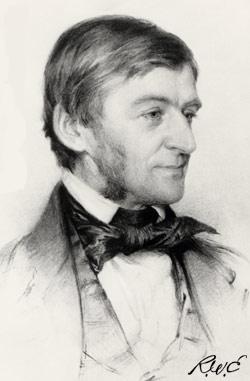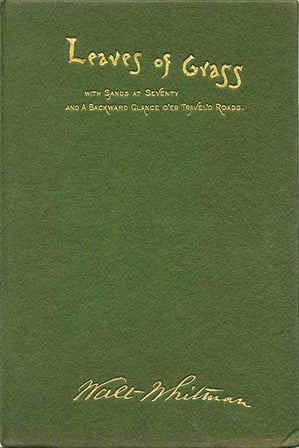"In every work of genius we recognize our own rejected thoughts:
they come back to us with a certain alienated majesty."
- Ralph Waldo Emerson
Philosophy, in its purest form, should be about a love of wisdom. Unfortunately, it is often a field dominated by pedants, logicians, and empiricists. Yet we know life is scarcely described best through laws and technicalities. It is far too complex and marvelous for rigid deconstruction. Ralph Waldo Emerson understood this well. And he offered nearly two centuries of readers a loving interpretation of life, art, and the New World in which he lived.
 One of his countless great aphorisms, Emerson’s above quote reveals how he was both wise and unconventional in his wisdom. Those who are presented with wisdom, he argues, are not so much informed as they are reminded. At her most successful, the intellectual provides her reader with the nutrients necessary to let blossom a truth that was merely subterranean: existent, but not yet whole. Not only is Emerson’s theory invigorating, but he is also being particularly American in his ideology, asserting both the inherent glory of the individual and a democratic faith in everyone’s capacity for wisdom. We are already philosophical; all we need is a little intellectual push.
One of his countless great aphorisms, Emerson’s above quote reveals how he was both wise and unconventional in his wisdom. Those who are presented with wisdom, he argues, are not so much informed as they are reminded. At her most successful, the intellectual provides her reader with the nutrients necessary to let blossom a truth that was merely subterranean: existent, but not yet whole. Not only is Emerson’s theory invigorating, but he is also being particularly American in his ideology, asserting both the inherent glory of the individual and a democratic faith in everyone’s capacity for wisdom. We are already philosophical; all we need is a little intellectual push.
Emerson epitomizes this American ideology, that which emphasizes the importance of the individual as well as the common faiths of democracy. Like many men of genius, Emerson himself embodies contradictions. As Theodore Parker wrote in 1850, he is “the child of Christianity and of American political idealism and yet outside the church and outside the state.” That Emerson is simultaneously of and outside of his subjects is the phenomenon responsible for his wide intellectual range.
Emerson is not necessarily the best American writer, but he is an indispensable one. He is responsible for establishing a literary tradition of the Americas, one markedly separate from that of the Old World. Not only are U.S. writers indebted to him, but Latin American authors like Jorge Luis Borges display his influence as well. In the United States, Emerson has had heirs like Emily Dickinson and Walt Whitman, who by most accounts, are superior to him. Yet despite being overcome by his descendants, the current of influence flows outward from him.
 Walt Whitman would take Emerson's spirit—that of rarefying the natural as divine, of embracing the organic experience, the various powers of soul and mind—and create a masterpiece. The bold Walt Whitman delivered to Emerson a copy of Leaves of Grass, a stunning first edition which was splendidly crafted with the poet’s famous portrait as frontispiece. Emerson graciously read the unsolicited submission and wrote a glowing five page letter to its author. Emerson praised the work’s “great power,” its “courage of treatment,” and its “large perception.” Naturally, Emerson’s enthusiasm drummed up interest for the young poet’s book, and Whitman seized the opportunity. He soon printed a second edition of Leaves of Grass, including on its spine, in gold leaf, a quotation from Emerson’s letter: I Greet You at the Beginning of a Great Career. It is said that Emerson was not happy that his words were used without his permission, but no trespass can change the artistic fraternity the pair share. Whitman took Emerson’s American spirit and mastered it. He owed a great debt to his influence. Whitman famously said of this indelible impact: “I was simmering, simmering, simmering; Emerson brought me to a boil.”
Walt Whitman would take Emerson's spirit—that of rarefying the natural as divine, of embracing the organic experience, the various powers of soul and mind—and create a masterpiece. The bold Walt Whitman delivered to Emerson a copy of Leaves of Grass, a stunning first edition which was splendidly crafted with the poet’s famous portrait as frontispiece. Emerson graciously read the unsolicited submission and wrote a glowing five page letter to its author. Emerson praised the work’s “great power,” its “courage of treatment,” and its “large perception.” Naturally, Emerson’s enthusiasm drummed up interest for the young poet’s book, and Whitman seized the opportunity. He soon printed a second edition of Leaves of Grass, including on its spine, in gold leaf, a quotation from Emerson’s letter: I Greet You at the Beginning of a Great Career. It is said that Emerson was not happy that his words were used without his permission, but no trespass can change the artistic fraternity the pair share. Whitman took Emerson’s American spirit and mastered it. He owed a great debt to his influence. Whitman famously said of this indelible impact: “I was simmering, simmering, simmering; Emerson brought me to a boil.”
Likewise, when Emily Dickinson began to anonymously publish poems, they showed such an influence that readers suspected their true author was Emerson.
Emerson was not confined to expressing his insight exclusively to print. He was a well-paid and famous lecturer. He spoke on a dizzying range of topics like culture, the philosophy of history, American civilization, anti-slavery, and whatever else he desired. He would deliver up to 70-80 lectures a year in his prime, touring locations over the northern United States and in Canada. Through his lectures, he attracted the attention of Herman Melville, who attended all of Emerson’s speaking engagements in New York City.
Emerson also interacted with contemporaries in much more direct ways. He would go on walks with Nathaniel Hawthorne. He was famously associated with Henry David Thoreau. He also captured the attention of leading theologian and intellectual, Henry James Sr., father to William and Henry.
While more recent authors, such as Wallace Stevens and Robert Frost, happily and knowingly incorporated Emerson, not everyone embraced him. Writers like Edgar Allan Poe and Southerners like Robert Penn Warren loathed Emerson. These differences were often political. Emerson was not only a flagrant abolitionist, he was a supporter of the radical John Brown, a man significantly responsible for the beginning of the Civil War. In the end, Emerson never loved the South, and the South felt the feeling was mutual.
T.S. Eliot said that Emerson’s essays “are already an encumbrance.” Feelings such as these once relegated Emerson out of academic vogue, but the majority of scholars understand that although they may not be dealing with the best American writer, they are dealing with an essential one. From the works of Whitman on, Emerson’s receptivity to experience, his shrewdness of perspective, and his vocabulary for a New World resonate. Because he was a pioneer, American writers may choose to deviate, but all must, for a time, walk on ground first tread by Emerson.









